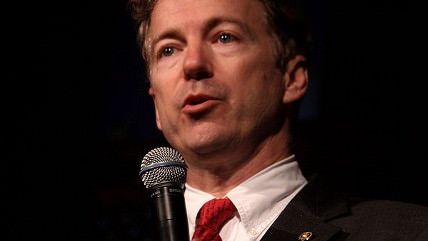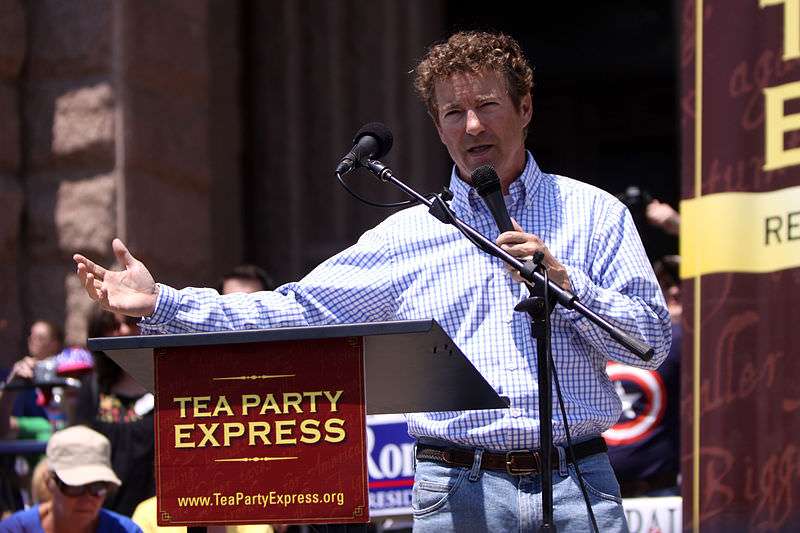Rand Paul Has Work To Do Before He is the Next "Generation-Defining Senator" on US Foreign Policy


The Associated Press have published an article on Kentucky Republican Sen. Rand Paul's foreign policy, which has as one of its introductory sentences the following:
Is Rand Paul the next generation-defining senator on American foreign policy?
Good question, especially considering that Paul is widely expected to run for president in a few years.
Although Paul may be known as a prominent non-interventionist, he must do more to more fully explain his foreign policy before he can be characterized as "the next generation-defining senator on American foreign policy." As it stands Paul's foreign policy includes unclear policy proposals for how to deal with Islamic fundamentalism based on Cold War-style "containment."
Since announcing his intention to run for the Senate back in 2009, Paul has not shied away from advocating for a non-interventionist foreign policy, putting himself at odds with some of his Republican colleagues.
Thankfully for Paul, the Obama administration's policies have given him plenty of opportunities to highlight his own views on foreign policy.
During his almost 13-hour filibuster of John Brennan's nomination to the CIA Paul directed attention to the fact that the Obama administration has used drones to kill American citizens. As the AP noted, two months after the filibuster "Obama revamped his drone policy to set tougher standards for when the U.S. can target and kill al-Qaeda or other terrorists who pose "a continuing, imminent threat" to Americans."
Last July, after the coup in Egypt, Paul argued for ending foreign aid to Egypt. Despite the fact that many Democratic and Republican senators opposed Paul's push to have aid suspended, the Obama administration did announce that some military aid would be suspended earlier this month.
Paul has been one of the strongest critics of intervention in Syria, arguing that it would be unwise to assist Assad's opposition, which contains fighters with links to Al Qaeda.
Paul's positions on Egypt and Syria should not have been surprising given what he said during a speech on foreign policy at The Heritage Foundation last February.
However, it was in this speech that Paul lauded a policy of "containment" while drawing comparisons between communism and radical Islam, without explaining exactly how radical Islam can be contained. The Soviet Union and its allies had distinct geographical boundaries and diplomatic representatives. Al Qaeda and its allies are spread throughout the world and the U.S. does not negotiate with terrorists, making the sort of "containment" advocated by George Kennan very difficult to implement with respect to Islamic terrorism, which Paul accepts is a danger.
I am a fan of Paul's record on foreign policy. But before he can become "the next generation-defining senator on American foreign policy" he needs to further explain how radical Islam can be contained if the U.S. becomes less involved in foreign affairs. Thankfully, the coming months and years will provide ample opportunties for Paul to outline his foreign policy more fully.
Editor's Note: As of February 29, 2024, commenting privileges on reason.com posts are limited to Reason Plus subscribers. Past commenters are grandfathered in for a temporary period. Subscribe here to preserve your ability to comment. Your Reason Plus subscription also gives you an ad-free version of reason.com, along with full access to the digital edition and archives of Reason magazine. We request that comments be civil and on-topic. We do not moderate or assume any responsibility for comments, which are owned by the readers who post them. Comments do not represent the views of reason.com or Reason Foundation. We reserve the right to delete any comment and ban commenters for any reason at any time. Comments may only be edited within 5 minutes of posting. Report abuses.
Please to post comments


Although Paul may be known as a prominent non-interventionist, he must do more to more fully explain his foreign policy...\
Politicians who define their positions succinctly don't get elected president. Voters these days want a blank slate onto which they can scribble their own foreign or domestic policy (if they even bother to think one up).
Based on your statement here, I can see your foreign policy ideas track closely with my own.
Therefore, I plan to vote for you in 2016. For something.
In the meantime, do you have a newsletter to which I might subscribe?
Paul looks like the closest thing I've seen in major national party politics to having a rational foreign policy framework. Yes, compared to the status quo, he's a non-interventionist. But, realistically, I don't think that's an appropriate assessment. Compared with the status quo, Ghengis Khan would be a relative non-interventionist. Essentially, the argument he laid out at Heritage was that of a geo-political realist.
he needs to further explain how radical Islam can be contained if the U.S. becomes less involved in foreign affairs.
The (somewhat) short answer ought to be:
1) Article 1, Section 8 of the U.S. Constitution does not give the U.S. federal government any jurisdiction over "containing" the religious choices of foreigners.
2) Amendment 1 of the U.S. Constitution clearly prohibits interfering with the religious choices of U.S. citizens.
I think you might have misunderstood what he was saying.
How about not worrying about the very unspecific "radical islam", and just deal with actual shit when it comes up?
I don't think that's necessarily a great approach. It makes sense to recognize that there are external threats or challenges and have some sort of structured framework to decide how to deal with beyond just on an ad hoc basis.
Ending the indiscriminate drone murder campaign would be a good first step.
And I completely agree. But, waiting for something to crop up when you know that Islamic radicalism is a very real issue strikes me as impractical.
Ending the indiscriminate drone murder campaign would be a good first step to more American deaths at the hands of AQ.
If you want to reduce American deaths heat the hands of AQ, withdraw American soldiers from places (i.e. Afghanistan) where they are easy targets and are fighting a war that does nothing to protect US national security.
Well, by that logic, if indiscriminate murder is the way to prevent American deaths that the hands of AQ, why not just nuke everywhere?
US intervention in the middle east has been the greatest unifying factor for Islamic factions.
Then they'll never unify because they're killing each other more than ever.
In the fiscal train wreck that is coming 'foreign policy' will be irrelevent. We won't be able to project power either economically or militarily. Foreign policy will just mean what we can get from Mexico (cheap labor) and Canada (cheap resources) so the assholes in DC can spread enough rhetorical pablum to keep their jerbz.
"We won't be able to project power either economically or militarily. "
I hate to say it but you are wrong there.
The eventual collapse of the dollar will certainly damage us but it won't really stop the flow of oil or our ability to move ships, tanks, planes, and troops around the world nor will it make all of those assets just go away.
Then on the economic front as bad as things will be here they will be worse in almost every other 1st and 2nd world country out there because they are all in debt as badly or worse than us and they are heavily dependent on our consumer market for their economies continued functioning.
Hmmm...not convonced but I will reconsider...
None of that matters. No money = no power projection.
But that is just it, we won't have *no* money, just significantly less money and the rest of the world will have even less money relatively speaking. More importantly however it is not money that matters but the assets you can buy with money.
he needs to further explain how radical Islam can be contained if the U.S. becomes less involved in foreign affairs
What the Hell?
Kill anyone who attacks us. Kill them, break their stuff, and go home.
If they chant, burn flags and such - yawn and ignore.
Let the spies return to looking for threats from specific, credible bad actors only.
How does that work for everyone?
Caveats:
1) No US Government funded weapons buys, let them work it out with the military-industrial complex directly for cash.
2) US humanitarian aid can only be give 5 years out of any 20 year timeperiod.
Oh yes, cash and carry only.
"The Soviet Union and its allies had distinct geographical boundaries and diplomatic representatives."
The Shining Path in Peru, the Viet Cong in South Vietnam, the MPLA in Angola, the Red Brigades in Italy--within what distinct geographic boundaries were the Soviet Union and its allies restricted, and who were their diplomatic representatives?
You start with the assumption that we must have a war on terror, then go on to point out that Paul is not specific enough on how to implement a war on terror. Of course the real purpose of implementing a war on terror is simply to continue American hegemony and crony capitalism overseas. Those in power could really care less about terrorists.
I think this article goes a long way (if you read between the lines) in showing just how far from libertarianism Reason is and that nothing has really changed from Reasons originally founding and funding from crony capitalists.
The trick for Reason is how to take a position against a powerful political entity who actually believes in non-intervention, which could negatively impact certain business interests overseas, when Reasons basic philosophy, libertarianism, is founded in non-aggression.
Sorry, but you aren't fooling me.
Man I hate it when people possess the ability to think critically.
/sarc
Well, if Jews from 3,000 years ago were running around today with modern weapons capabilities, I'd be concerned, as well.